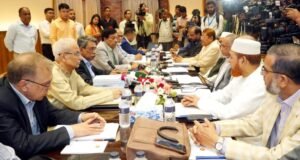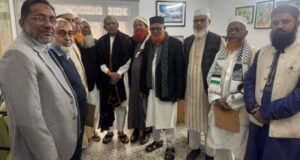 The Afghan Taliban released an audio message Saturday it said was from leader Mullah Akhtar Mansour, vehemently rejecting reports of his death in a firefight with his own commanders as “enemy propaganda”.
The Afghan Taliban released an audio message Saturday it said was from leader Mullah Akhtar Mansour, vehemently rejecting reports of his death in a firefight with his own commanders as “enemy propaganda”.
The 16-minute file said those “rumours” had been deliberately planted to weaken the Taliban, which has seen a new resurgence under the firebrand supremo despite its internal divisions.
“I have recorded this message to let everyone know that I am alive,” the man purported to be Mansour says in a relaxed drawl.
Multiple reports citing intelligence and insurgent sources had stated that Mansour was wounded or killed on Tuesday in a firefight at an insurgent gathering in Kuchlak.
“I didn’t have a fight with anyone, no meeting was held and I have not been to Kuchlak (near Quetta in Pakistan) in years. This is all enemy propaganda,” the message added.
The clip, emailed to media by a Taliban spokesman, comes after days of fevered speculation about the fate of Mansour, who was elected leader just four months ago in a bitter power succession.
The voice in the clip could not be independently verified by AFP while some militant commanders said it appeared to be that of Mansour.
But government spokesman Sultan Faizi, who sparked a flurry of reactions when he tweeted on Friday that Mansour was dead, said it was not certain the audio message was from him.
“We will do our assessment,” he said in a new tweet.
The Taliban, which saw its first formal split last month, had appeared anxious to quell speculation about Mansour’s death as it grapples with simmering divisions inside the movement.
Vehement denials by the Islamist group of any shoot-out had fallen on sceptical ears, especially after they kept the death of longtime chief Mullah Omar secret for two years.
“The Taliban is suffering from a credibility crisis after they admitted to hiding Omar’s death,” Kabul-based military analyst Jawed Kohistani told AFP.
Mansour was declared Taliban leader on July 31 after the insurgents confirmed the death of Omar, who led the Islamist movement for about two decades.
But splits immediately emerged in the group, with some top leaders refusing to pledge allegiance to Mansour, saying the process to select him was rushed and even biased.
Many were also unhappy that Omar’s death had been kept secret for two years — during which time annual Eid statements were issued in his name.
A breakaway faction of the Taliban led by Mullah Mohamed Rasool was formed last month, in the first formal division in the once-unified group.
But Mansour’s group has seen a resurgence in recent months, opening new battlefronts across the country with Afghan forces struggling to beat back the expanding insurgency.
They briefly captured the strategic northern city of Kunduz in September in their most spectacular victory in 14 years and opened new battlefronts across the country.
Speculation about Mansour’s death has also threatened to derail a renewed regional push to jump-start peace talks with the Taliban.
Mansour is believed to be a proponent of talks with Afghan authorities, a deeply contentious issue that has prompted much rancour within hardline insurgent ranks.
Pakistan, which wields considerable influence over the militants, hosted a historic first round of peace negotiations in July.
But the dialogue process stalled soon after Omar’s death was announced.
The United States and China have been pushing for the process to restart, but frosty ties between Islamabad and Kabul have been hampering those efforts.
 Weekly Bangla Mirror | Bangla Mirror, Bangladeshi news in UK, bangla mirror news
Weekly Bangla Mirror | Bangla Mirror, Bangladeshi news in UK, bangla mirror news






